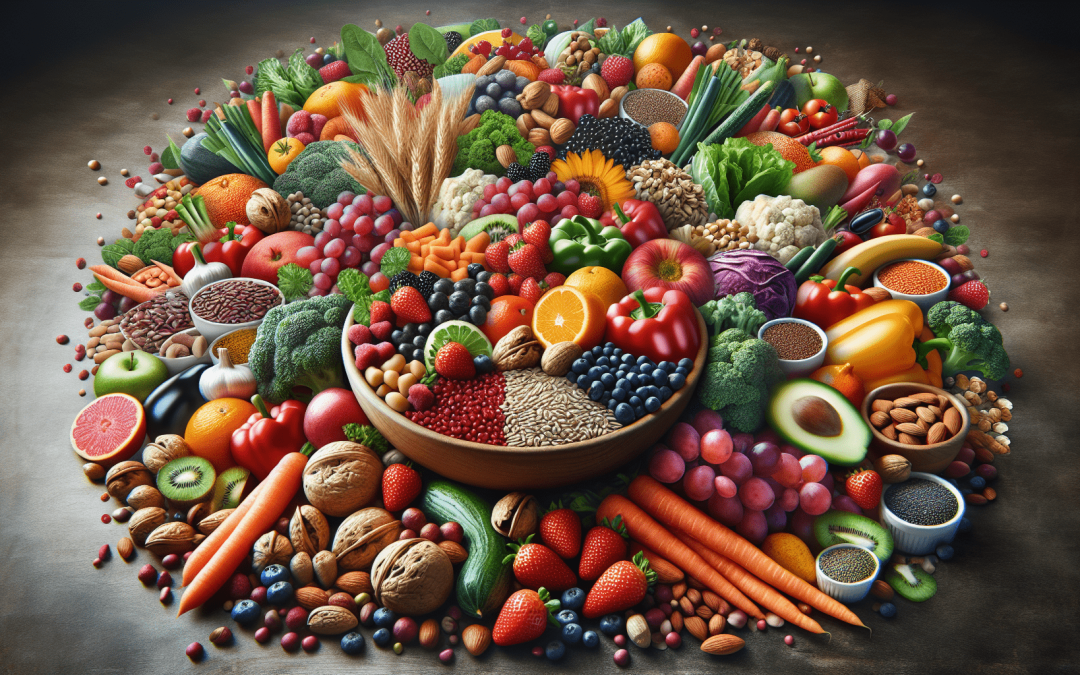Are you ready to unlock the power of whole foods and enhance your well-being? In this article, we will explore the fascinating realm of whole foods, discussing their immense nutritional value and the numerous benefits they offer. From vibrant fruits and vegetables to nourishing grains and legumes, whole foods provide us with essential vitamins, minerals, and antioxidants that fuel our bodies and boost our immune systems. By incorporating a variety of whole foods into your diet, you can experience improved energy levels, enhanced digestion, and overall vitality. Get ready to embark on a journey toward optimal health and discover how to harness the full potential of these incredible gifts from nature.
Understanding Whole Foods
Definition of whole foods
Whole foods refer to unprocessed or minimally processed foods that are as close to their natural state as possible. They are foods that have not been refined, modified, or had any of their natural components removed. Whole foods are typically rich in nutrients and offer a wide range of health benefits.
Benefits of consuming whole foods
Consuming whole foods provides numerous benefits for your overall health and well-being. These foods are not only packed with essential vitamins and minerals but also high in fiber, antioxidants, and phytochemicals. By including whole foods in your diet, you can prevent chronic diseases, improve digestion and gut health, boost your immune system, maintain healthy energy levels, and manage a healthy weight.
Examples of whole foods
Some examples of whole foods include fruits, vegetables, whole grains, legumes, nuts, and seeds. These foods are unprocessed and retain their natural nutritional value. Fresh apples, leafy greens, quinoa, lentils, almonds, and chia seeds are just a few examples of whole foods that can be easily incorporated into your diet.
Nutritional Value of Whole Foods
Rich in essential vitamins and minerals
Whole foods are an excellent source of essential vitamins and minerals that your body needs to function properly. Fruits and vegetables, in particular, are packed with vitamins such as vitamin C, vitamin A, vitamin K, and various B vitamins. These nutrients help support your immune system, promote healthy vision, aid in energy production, and contribute to overall well-being.
High in fiber
Fiber is an essential component of whole foods and plays a crucial role in maintaining good digestive health. Whole grains, fruits, vegetables, legumes, and nuts are all great sources of dietary fiber. Consuming an adequate amount of fiber can help regulate bowel movements, promote satiety, and support heart health by reducing cholesterol levels.
Source of antioxidants and phytochemicals
Whole foods are abundant in antioxidants and phytochemicals, which are natural compounds that have been shown to have numerous health benefits. Antioxidants help protect your body against free radicals, which can damage cells and contribute to chronic diseases. Phytochemicals, on the other hand, have been associated with reducing the risk of certain cancers, improving overall immune function, and promoting heart health.

Health Benefits of Whole Foods
Prevention of chronic diseases
One of the primary benefits of consuming whole foods is their ability to prevent chronic diseases. The nutrient-rich nature of whole foods, combined with their high fiber content and abundance of antioxidants and phytochemicals, can help reduce the risk of developing conditions such as heart disease, type 2 diabetes, certain cancers, and obesity.
Improved digestion and gut health
Whole foods, especially those high in fiber, promote a healthy digestive system and support optimal gut health. The fiber in whole foods adds bulk to your stools, making them easier to pass and reducing the risk of constipation. Additionally, the fiber acts as a prebiotic, providing nourishment to the beneficial bacteria in your gut, which can improve digestion and nutrient absorption.
Boosted immune system
The vitamins, minerals, and antioxidants found in whole foods play a crucial role in supporting a healthy immune system. Vitamin C, for example, is known for its immune-boosting properties and can help protect against common illnesses like the cold and flu. Other nutrients, such as vitamin A and zinc, also contribute to immune function and can help the body fight off infections and diseases.
Enhanced energy levels
Whole foods provide a sustainable source of energy due to their nutrient density. Unlike processed foods that are high in refined sugars and unhealthy fats, whole foods contain complex carbohydrates, healthy fats, and protein that are slowly digested, providing a steady release of energy throughout the day. By incorporating whole foods into your diet, you can experience improved energy levels and avoid energy crashes.
Maintenance of healthy weight
Incorporating whole foods into your diet can support weight management and help maintain a healthy weight. Whole foods are generally lower in calories compared to processed foods and tend to be more satiating due to their higher fiber and protein content. They can keep you fuller for longer, reduce cravings, and contribute to a balanced, nutritious diet, which is essential for maintaining a healthy weight.
Tips for Incorporating Whole Foods into Your Diet
Shop at farmers markets or organic grocery stores
One of the best ways to incorporate more whole foods into your diet is by shopping at farmers markets or organic grocery stores. These places often offer a wide range of fresh, locally sourced fruits, vegetables, and other whole foods that are free from pesticides and harmful chemicals. Supporting local farmers and choosing organic options can ensure you are getting the highest quality whole foods.
Read food labels and choose minimally processed options
When grocery shopping, it is important to read food labels carefully. Choose minimally processed options that contain only a few ingredients and avoid products with added sugars, artificial additives, or excessive sodium. Opt for whole grain products, such as whole wheat bread, instead of refined grains to increase your whole food intake.
Focus on variety and seasonal produce
To ensure you get a wide range of nutrients, it is essential to focus on variety when incorporating whole foods into your diet. Explore different fruits, vegetables, whole grains, and legumes to diversify your nutrient intake. Additionally, try to choose seasonal produce whenever possible, as they are often fresher, more flavorful, and more affordable.
Use whole grains instead of refined grains
Switching from refined grains to whole grains can have a significant impact on your overall health. Whole grains, such as brown rice, quinoa, and whole wheat pasta, are higher in fiber, essential nutrients, and antioxidants compared to their refined counterparts. They also have a lower glycemic index, which means they have a slower and steadier effect on blood sugar levels.
Include lean protein sources and plant-based proteins
Protein is an important macronutrient that plays a vital role in maintaining and repairing body tissues, supporting muscle growth, and providing satiety. When incorporating whole foods into your diet, be sure to include lean protein sources, such as chicken breast, fish, tofu, and legumes. Plant-based proteins like lentils, quinoa, and chia seeds are also excellent options for those following a vegetarian or vegan diet.
Prepare meals at home using whole ingredients
Preparing meals at home using whole ingredients gives you full control over what goes into your meals and allows you to maximize the nutritional value of your food. By cooking with whole foods, you can avoid added sugars, unhealthy fats, and excessive sodium commonly found in processed foods. Experiment with different recipes and cooking methods to make your meals exciting and enjoyable.

Cooking Techniques to Preserve Nutrients in Whole Foods
Steaming
Steaming is a cooking technique that involves using steam to cook food. It is an excellent method for preserving the nutrients in whole foods as it requires minimal water and shorter cooking times. Steaming vegetables, for example, helps retain their vibrant colors, crisp texture, and nutritional value.
Stir-frying
Stir-frying involves cooking food quickly over high heat while continuously stirring. This method is ideal for maintaining the nutritional value of vegetables and retaining their vibrant colors. Stir-frying also preserves the natural flavors of the ingredients, resulting in a delicious and nutrient-packed meal.
Roasting
Roasting is a dry heat cooking method that uses hot air to cook food. It is a great technique for bringing out the natural flavors of whole foods, especially vegetables. Roasting vegetables in the oven allows them to caramelize, enhancing their taste and texture while retaining their nutritional value.
Grilling
Grilling is a popular cooking method that adds smoky flavors to food while keeping them nutritious. Whether it’s grilling lean proteins like chicken or vegetables like peppers and zucchini, this technique helps retain the natural flavors and textures of whole foods.
Raw consumption
Consuming whole foods in their raw form is another way to maximize their nutritional value. Raw fruits, vegetables, and nuts retain their natural enzymes and nutrients, providing you with a nutrient-dense and refreshing option. However, it is essential to be cautious and ensure proper food safety practices when consuming raw foods.
Recipes and Meal Ideas Using Whole Foods
Smoothie bowls with fresh fruits and nuts
Start your day with a nutritious and delicious smoothie bowl. Blend together your favorite fruits, such as berries, bananas, and mangoes, with a liquid base like almond milk or coconut water. Pour the smoothie into a bowl and top it with fresh fruits, nuts, and a sprinkle of chia seeds for added nutritional value.
Vegetable stir-fry with brown rice
Whip up a quick and healthy vegetable stir-fry by sautéing an assortment of colorful vegetables like bell peppers, broccoli, snap peas, and carrots in a pan with some olive oil and garlic. Season with soy sauce or your favorite stir-fry sauce and serve it over a bed of cooked brown rice for a satisfying and nutrient-rich meal.
Quinoa salad with mixed vegetables
Combine cooked quinoa with a variety of fresh vegetables like cherry tomatoes, cucumbers, bell peppers, and red onions to create a vibrant and nutritious salad. Drizzle the salad with a homemade dressing made from olive oil, lemon juice, and a touch of honey. Add in some chopped herbs like parsley or cilantro for added flavor.
Baked salmon with roasted vegetables
For a protein-packed meal, bake a fresh salmon fillet and pair it with a side of roasted vegetables. Season the salmon with herbs and spices of your choice, such as dill and lemon zest, and bake it in the oven until cooked through. Serve alongside roasted sweet potatoes, Brussels sprouts, and asparagus for a well-rounded and flavorful dish.
Homemade granola with yogurt and berries
Create your own nutritious and delicious granola by combining rolled oats, nuts, seeds, and a touch of sweetener like honey or maple syrup. Bake the mixture in the oven until golden brown and crispy. Serve the homemade granola with plain yogurt and a handful of fresh berries for a wholesome and satisfying breakfast or snack.

Common Myths and Misconceptions about Whole Foods
Whole foods are too expensive
A common myth about whole foods is that they are expensive. While it is true that some organic or specialty whole foods can be pricier, there are plenty of affordable options available. Farmers markets, local produce stands, and bulk sections in grocery stores often offer reasonably priced whole foods. Additionally, by prioritizing whole foods and reducing the consumption of processed foods, you may find that your overall food budget adjusts accordingly.
Whole foods are tasteless or bland
Another misconception is that whole foods are tasteless or bland. On the contrary, whole foods can be incredibly flavorful when properly prepared and seasoned. Experimenting with different herbs, spices, marinades, and cooking techniques can elevate the taste of whole foods. The natural flavors of whole foods shine through, resulting in delicious and satisfying meals.
Whole foods take too much time to prepare
Many people believe that preparing whole foods is time-consuming. While it is true that some whole foods may require more preparation than pre-packaged meals or convenience foods, there are plenty of quick and easy recipes that incorporate whole ingredients. With a little planning, batch cooking, and meal prepping, it is possible to enjoy the benefits of whole foods without spending excessive time in the kitchen.
Whole foods are restrictive in dietary options
Some individuals may think that adopting a whole foods diet restricts their dietary options. However, there is a wide variety of whole foods available, allowing for a diverse and balanced diet. Whether you prefer a vegetarian, vegan, gluten-free, or omnivorous lifestyle, there are plenty of whole food options to suit your dietary preferences and needs.
Sustainable and Ethical Considerations of Whole Foods
Supporting local farmers and small-scale agriculture
Choosing whole foods that are locally sourced supports local farmers and small-scale agriculture. By purchasing from farmers markets or directly from local producers, you can contribute to the local economy, reduce food miles, and promote sustainable farming practices. Supporting local farmers also helps preserve agricultural diversity and maintain traditional farming methods.
Reducing environmental impact through organic farming
Opting for organic whole foods helps reduce the environmental impact of agriculture. Organic farming methods prioritize soil health, biodiversity, and the use of natural fertilizers and pest control methods instead of synthetic chemicals. By choosing organic whole foods, you are supporting sustainable farming practices that protect the environment and promote long-term soil and ecosystem health.
Avoiding harmful chemicals and pesticides
Whole foods, especially organic options, are free from harmful chemicals and pesticides commonly found in conventional produce. Choosing whole foods that are grown without synthetic chemicals helps reduce potential health risks associated with pesticide exposure. It also supports a more sustainable and eco-friendly approach to food production.
Promoting fair trade and ethical food production
When opting for ethically sourced whole foods, you contribute to fair trade practices and support workers’ rights, both locally and globally. Certain certifications, such as Fairtrade, ensure that farmers and workers are paid fair wages, work in safe conditions, and have access to education and healthcare. By choosing ethically produced whole foods, you can make a positive impact on the livelihoods of those involved in the food production process.
Challenges and Solutions in Harnessing the Full Potential of Whole Foods
Accessibility to affordable whole foods
One of the challenges in harnessing the full potential of whole foods is the accessibility to affordable options, especially in areas with limited resources or food deserts. To overcome this challenge, community initiatives, such as urban gardens, co-op grocery stores, and mobile farmers markets, can be established to improve access to affordable whole foods in underserved areas.
Lack of knowledge and awareness
Many individuals may lack knowledge and awareness about the benefits and preparation techniques of whole foods. Educational programs, cooking workshops, and community outreach can help address this challenge. By providing resources and information about the nutritional value and cooking methods of whole foods, more people can make informed choices and incorporate these foods into their daily diets.
Time constraints in meal preparation
In today’s fast-paced society, time constraints can pose a challenge when it comes to preparing whole meals from scratch. To overcome this challenge, meal planning, batch cooking, and utilizing time-saving kitchen appliances, such as slow cookers or pressure cookers, can be helpful. By setting aside dedicated time for meal preparation and utilizing efficient cooking methods, incorporating whole foods into your diet becomes more manageable.
Overcoming taste preferences and habits
Preferences for processed and unhealthy foods can pose a challenge in harnessing the full potential of whole foods. It may require some adjustment in taste preferences and breaking old habits. Gradually incorporating whole foods into your diet, experimenting with different flavors and spices, and finding healthy alternatives for your favorite processed foods can help overcome this challenge. Over time, your taste buds may adapt, and you may even develop a preference for whole foods.
Conclusion
Understanding and harnessing the full potential of whole foods is essential for your overall health and well-being. These unprocessed or minimally processed foods offer numerous benefits, including optimal nutrition, disease prevention, improved digestion, boosted immunity, and sustained energy levels. By following simple tips like shopping at farmers markets, choosing whole grains, incorporating lean proteins, and cooking at home, you can easily incorporate whole foods into your daily diet.
Remember that whole foods can be enjoyed through various cooking techniques like steaming, stir-frying, roasting, grilling, and even raw consumption. Delicious recipes and meal ideas, such as smoothie bowls, vegetable stir-fries, and quinoa salads, provide inspiration for incorporating whole foods into your meals.
Dispelling common myths and misconceptions, promoting sustainable and ethical considerations, and addressing challenges like accessibility, knowledge gaps, time constraints, and taste preferences are vital in maximizing the potential of whole foods. By prioritizing whole foods and making them a fundamental part of your diet, you can experience improved health and well-being, while also supporting local farmers, reducing environmental impact, and contributing to a more ethical and sustainable food system.
Related Content
- The 2025 Ultimate Guide to the Best probiotic food list (10 Effective Tips to Boost Your Gut Health)
- How to Shop Organic at Your Local Grocery Store: A Shopper’s Guide
- 10 Effective Organic Foods for Immunity: The Ultimate Guide for 2025
- Best Organic Spice Shops Near Me in Pass a Grille Beach, Florida 33706
- Top 10 Nutrient Dense Organic Snacks (2025 Guide) for Better Health








